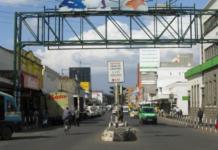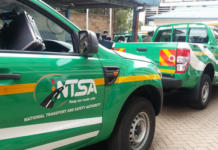When a team of Kenya Revenue Authority (KRA) officials unlocked a 40-foot container at the Port of Mombasa late last month, a mountain of furniture sets and other household goods tumbled out of the container.
As the team struggled to remove the sofa sets and cushions from the container, they noticed a brand new white Range Rover Sport with a sleek exterior. That was the scenario when KRA uncovered a syndicate of illegal importation of high-end vehicles disguised as household goods; which hinted at a cartel of tax evaders in the UK and Uganda targeting the Kenyan market.
KRA officials said they opted to unlock the container after scanners at the port were unable to clearly detect the type of cargo stashed in it despite the declaration form indicating the contents were household goods.
Two Range Rovers and a Mercedes Benz, all valued at Sh28 million, were discovered in the racket which, according to KRA Southern Region manager Nicholas Kinoti, would have cost the government Sh8.5 million in tax revenue.
The supplier of the motor vehicles, as indicated on the declaration documents, was Saidar Muteweta of London and the cargo was destined to Uganda to a consignee identified as Abubakar Sekimwanyi. Most of the vehicles intercepted are said to be in transit to Uganda, the Democratic Republic of Congo, Tanzania and Rwanda.
Amidst the series of syndicates, Kenyan car dealers are an unhappy lot, saying the tax evasion cartels are causing havoc on the business through illegal importation, coupled with the influx of cheaper vehicles diverted from Uganda-bound cargo.
Questions, however, still linger on how illegal imports still find their way into the country through Mombasa port, a highly-guarded facility with state-of-the-art scanners.
According to authorities, Kenya being used by smugglers as a channel for illegal consignments may not end soon unless more stringent measures are put in place to seal the loopholes that have given smugglers a field day.
KRA and Kenya Ports Authority officials reveal that the status quo at the port allows containers of goods treated as “low risk” to pass without necessarily going through the verification process.
According to the officials, only goods regarded as high risk are taken through the verification process—which involves intense scanning to ensure the contents of the container are not contrabands—thereby paving way for masterminds in illegal dealings to have a raft of options for tricks to allow safe passage of their cargo.
“Not all the containers are scanned, which is based on intelligence information and the risk level related to the contents of the container in question,” said Kinoti.
Records indicate that masterminds in ivory smuggling have in the recent past been capitalising on the loophole to clinch hide their operations. For instance, a series of ivory seizures at the Port of Mombasa in the past two years have brought to light use of dried fish, unprocessed groundnuts, tea bags and sesame seeds to disguise the illegal trade.
The Kenya Wildlife Service believes suspects in the illegal trade have devised the use of foodstuff which have a pungent smell with intent to throw off sniffer dogs, but absence of measures that are stringent enough to check on the contents of consignments passing through the port might have attracted vehicle smugglers as well.
“KRA is in control of very small areas at the borders. Vast sections are open and are being used by smugglers. This is why it has been tough to fight these vices even with tight measures being put in place,” said Kinoti, adding that there is need for establishment of a multi-agency border patrol unit to seal the illegitimate routes.
Source : Media Max









![Top 20 Used Cars to Avoid in Kenya [PHOTOS]](../../../blog/wp-content/uploads/2013/11/nissan-370z.jpg)

